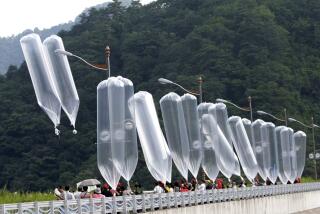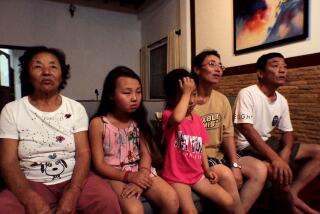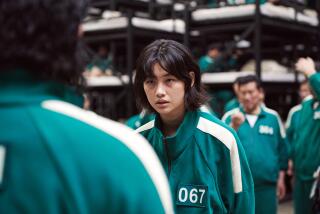Sony Pictures execs debated risk of âThe Interviewâ before cyberattack
Months before a devastating computer attack on Sony Pictures Entertainment, studio executives debated the risk of releasing the upcoming comedy âThe Interviewâ amid threats from North Korea that the movie was tantamount to an act of war.
Studio executives were cautioned by the Department of Homeland Security this summer that the film â which depicts a fictional assassination attempt on North Korean leader Kim Jong Un â could provoke retaliation, according to people with knowledge of the situation. Parent company Sony Corp. also expressed concerns to studio executives that the film could inflame tensions with North Korea.
The concerns were taken seriously, prompting high-level discussions at the studio, according to these people, who requested anonymity because they were not authorized to speak publicly about the studioâs internal debate.
A Sony Pictures spokesman said there was no warning from Homeland Security. A Homeland Security spokesman said he was unaware of any formal warning to the studio.
The incendiary nature of the film even came up at a table read of the script by actor Seth Rogen and others before it went into production in October 2013. Actor Jonah Hill, who is a friend of Rogenâs, attended the session that day. Hill approached Sony Pictures co-Chairman Amy Pascal during a break and expressed his incredulity that the studio had greenlighted the project.
âI saw Jonah go up to her and go, âAmy, you are [expletive] crazy.â Sheâs like, âAm I?ââ Rogen recalled in an interview last month, before the breach was disclosed. âI was like, âDonât say that to her!ââ
âItâs pretty amazing what they let us do,â added Rogen, who stars in and co-directed the film. âI donât know who else would let us do it.â
Federal law enforcement authorities say they are taking seriously the possibility that the North Korean government might have been behind the cyberattacks launched on Sony starting last month.
The breach has delivered one embarrassing blow after another to Sony Pictures, including the disclosure of Social Security numbers of thousands of current and former employees, confidential emails and other information. Five films, including the upcoming musical âAnnie,â were also leaked online.
The wave of leaks has caused chaos on the studio lot and sent morale plummeting. Hackers released the purported million-dollar salaries of 17 studio executives, code names used by celebrities when they travel and trash-talking communications about films in development.
âIt appears Sony doesnât have its house together,â said attorney Peter Toren, a cybersecurity expert who previously worked for the Department of Justice.
The breach is expected to cost Sony Pictures tens of millions of dollars as the company rebuilds its computer network, conducts a forensic investigation of the attack and deals with the legal fallout, including potential lawsuits from employees. It could also have an effect on the film industryâs creative choices.
âIâve got to believe that this will spook anybody from considering making the North Koreans bad guys in a film,â movie producer Bill Gerber said. âUnless you were dealing with something that was fact-based and very compelling, it might not be worth it.â
FBI Director James B. Comey said Tuesday that the FBI had not yet determined who was behind the attack on Sony. There has been speculation that disgruntled employees might be behind the attack on the studio, which went through several rounds of layoffs last year.
âAnything cyber is very complicated, tracing back malware and signatures especially,â Comey told reporters at a briefing. âIt is complicated business and I want to make sure before we make an attribution that I have high confidence in it.... Iâm not prepared to attribute it to any particular actor.â
North Korea has denied responsibility for the attack but praised the perpetrators. A hacking group called Guardians of Peace claims to be behind the assault. In June, North Korea called on the U.S. government to block the filmâs release or face a âdecisive and merciless countermeasure.â
Sony declined to comment on any discussions that may have occurred with executives at its parent company in Japan.
Internal discussions about potential complications with a movie are not uncommon in Hollywood, or at Sony.
Sony corporate executives in Japan previously had voiced concerns about how the 2012 film âZero Dark Thirty,â and its depiction of CIA interrogation tactics, would be received internationally, according to people familiar with the studio.
The 2006 movie âThe Da Vinci Codeâ prompted a discussion about whether that film might spark a backlash from the religious community. That picture centered on a bizarre murder involving a fringe Catholic group.
A decade ago, Howard Stringer, then head of Sonyâs U.S. operations, chastised studio executives for considering the possibility of distributing Michael Mooreâs controversial 2004 film âFahrenheit 9/11,â because of its political sensitivity, one of the people said.
Before production began on âThe Interview,â Sony executives had questioned whether the movie should depict a fictional country and dictator, and not North Korea and Kim Jong Un, Rogen said in the interview last month.
Sony executives discussed altering the script to make it more palatable politically. However, the filmmakers didnât want to modify the movieâs plot â and pushed back when the studio wanted to explore changing the ending.
âWe were like, âNo, weâre not going to change that,ââ Rogen said. âThey were like, âOK, guess thereâs nothing we can do. We had to ask.ââ
Pascal, who is known for her close rapport with Hollywood talent, supported the filmmakers in keeping the original construct, one person said.
North Koreaâs threat to retaliate came in June, and soon afterward Homeland Security issued its caution, the people close to the situation said.
But by that time, the project was already complete and being screened to test audiences. The studio could have opted to not release the picture, or it could have digitally altered the movie to remove references to North Korea and Kim Jong Un.
Instead, the studio pushed back its release to Christmas Day. The film will premiere Thursday in downtown Los Angeles.
Times staff writers Richard Serrano, Joseph Tanfani, Tim Phelps and Richard Verrier contributed to this report.
More to Read
From the Oscars to the Emmys.
Get the Envelope newsletter for exclusive awards season coverage, behind-the-scenes stories from the Envelope podcast and columnist Glenn Whippâs must-read analysis.
You may occasionally receive promotional content from the Los Angeles Times.













